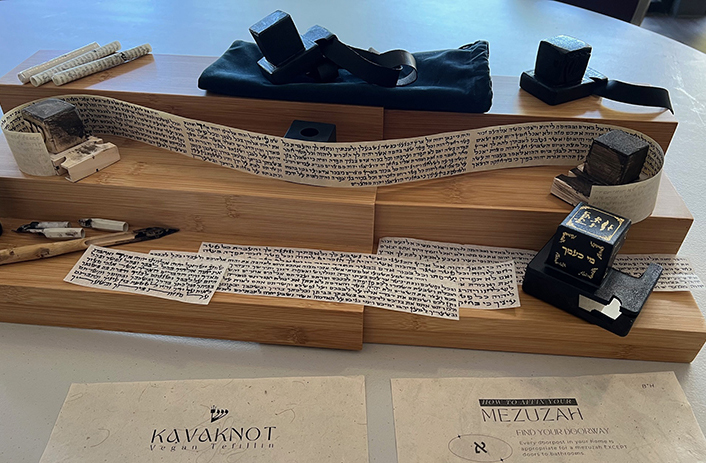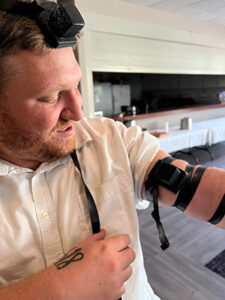
Story and Photos by Donald H. Harrison


SAN DIEGO – Health-conscious Devon Lantry works in the marketing division of Terra Biological, a company that produces vitamins and food supplements. Over the years, he wanted to adopt a vegan lifestyle but, he said, “I kept backsliding.” Only when he wrapped tefillin could he adhere to a vegan diet.
“It struck me that I was using tefillin to try to be nicer to animals and tefillin is made out of animals,” Lantry, 34, told me during an interview at Tifereth Israel Synagogue, where we are both members.
So, with a friend, software engineer Austin Weisgrau, whom he met in his high school B’nai B’rith chapter, Lantry decided to research whether tefillin – the phylacteries which observant Jews utilize in morning prayer – could be made from plants instead of animal hides.
In researching the idea, he said, he was horrified to learn that some tefillin manufacturers purchase cheaply the hides from industrial farms, “which means the most cruel, the most polluting, and the worst operations for workers.”
Lantry said Judaism is insistent upon treating animals kindly: “You will never separate a mother from her young; you only slaughter painlessly; you don’t slaughter if they are sick; animals are not allowed to be neglected or overworked. All these things are the opposite of factory farming.”
He said none of the 613 mitzvot in the Torah deal with using animal skins for such holy objects as tefillin, mezuzot, or Torahs. The halachah concerning using animal skins are rabbinic in origin, he said, and “if the rabbis who wrote those rules were to see factory farming, it would be very clear that we shouldn’t be supporting that – especially not making holy objects out of all that irresponsibility and suffering.”
So, Weisgrau, who lives in Oakland, and Lantry, who resides in Chula Vista, did some Internet research and found an Italian company that manufactures a leather-like substance from wine grape skins and other plants.
They liked the symbolism; wine is central to many Jewish ceremonies, although they were disappointed that the company does not make kosher wine. But first things first. Developing a vegan alternative to animal-based tefillin was the top of their agenda. Maybe, in the future, they can find a kosher vintner with the same capabilities.
Wine grape skins have “that waxiness, that oiliness, so they can bind together with various plant fibers,” Lantry said. Their tefillin straps are comprised of 60 percent wine grape skins and 40 percent fibers from other plants.
Bible verses written on parchment are incorporated into the compartments of tefillin and mezuzot, the symbol of Jewish residency that is affixed to the doorposts of homes. Shaddai Elementals, the company Lantry and Weisgrau created to manufacture and sell vegan mezuzot and tefillin, uses parchment made from trees instead of from hides.
“We did a lot of testing to find paper that can handle the traditional ink used for sefer torah and mezuzot,” Lantry said. “The ink is acidic and it needs to sit on top of the paper rather than bleeding in like a regular ink. So, we tweaked the ink formula to be a little more alkaline so it will last decades. It won’t start to degrade the paper. The paper is made from wood, from trees, but it is specifically meant to look and feel like animal parchment.”
The ink used to write the verses on the parchment “we make ourselves,” Lantry said. “The blackness in traditional Jewish ink comes from something called ‘oak galls.’ A wasp will lay her eggs in an oak branch, and the branch will swell up around the eggs, producing a golf ball-sized thing. They are all over Oakland. You can just walk down the street with many oak galls, so it is very helpful that Austin is in Oakland for that.”
Weisgrau and Lantry each do it all. They build the tefillin boxes and the mezuzot, write the biblical verses in Hebrew on the pieces of parchment, and connect the tefillin to the dyed wine grape skin-based leather.
Lantry said he was fascinated by calligraphy for several years before conceiving of the venture in tefillin and mezuzot. “I thought it was interesting how in any language, you can kind of push a letter in really extravagant ways and have everyone know what letter it is. Being Jewish, I found Hebrew interesting.”
Shaddai Elementals has been selling mezuzot and tefillin online at www.vegan-tefillin.com only since last December. Animal-hide tefillin can run from $250 to $1,500 depending on quality, Lantry said. A set of vegan tefillin costs the consumer $372, he added.
So, how is business? I asked. “It’s starting slow but picking up,” he said. “People just find it on our website and buy it. I think we have sold about 30 sets of tefillin – mostly for bar/ bat mitzvah presents – and about 100 mezuzah scrolls.”
Lantry said his start-up company would like to contract with trained soferim to boost production, but thus far, the scribes have been wary of working with plant-based products. He expressed hope that the matter can be argued before rabbinical conferences so that different branches of Judaism can declare vegan products kosher.
On the horizon, Lantry said, is what he believes will be the world’s first vegan Torah. He and Weisgrau have been assembling the vegan parchment, the vegan string, which will be used instead of animal tendons, and the ink. It would take many years for Lantry or Weisgrau to copy a Torah, letter by letter, word for word, so they are searching for a sofer with a lifetime’s experience to commission.
*
Donald H. Harrison is publisher and editor of San Diego Jewish World.
As a vegan and I was very happy to read about this wonderful company.
I recognized Austin Weisgrau’s name the second I saw it. Austin and his sister Sideara were my students at science camp just over twenty years ago. It’s nice to see that Austin stuck with his passion for science, from building models with K-nex to vegan Tefillin.
Austin, if you are reading this, know that Professor Eric is really proud of you.
So for their company you can say sofar so good.
Did you really have to say that?